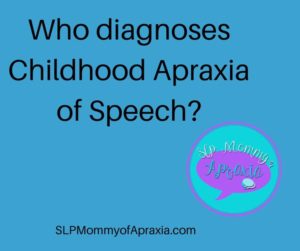Who diagnoses Childhood Apraxia of Speech?
Many parents often wonder who diagnoses Childhood Apraxia of Speech? They wonder where to seek help when questioning if their child has Childhood Apraxia of Speech (CAS).
Many professionals claim to be able to diagnose, and in fact parents report getting their child a diagnosis from professionals such as neurologists, developmental pediatricians, and psychologists to name a few. This is concerning because CAS is a speech disorder, and only speech/language pathologists are qualified to diagnose. In addition, not just any speech/language pathologist (SLP) is qualified to diagnose either. SLP’s need to have advanced knowledge and expertise in motor speech disorders and motor learning principles.
The American Speech/Language Hearing Association has a position statement on the matter.
You can read it here. https://www.asha.org/policy/PS2007-00277/
It’s important to look to credible resources such as these because even this position statement states it must not only be any SLP, but also and SLP who specializes in motor learning theory with skills in differential diagnosis.
In it, it says:
“It is the policy of ASHA that the diagnosis and treatment of CAS are the proper purview of certified speech-language pathologists with specialized knowledge in motor learning theory, skills in differential diagnosis of childhood motor speech disorders, and experience with a variety of intervention techniques that may include augmentative and alternative communication and assistive technology. It is the certified speech-language pathologist who is responsible for making the primary diagnosis of CAS, for designing and implementing the individualized and intensive speech-language treatment programs needed to make optimum improvement, and for closely monitoring progress.”
There is sometimes confusion that CAS is a medical diagnosis. It is a label for a speech diagnosis. There may be co-occurring medical issues, but the speech problem does not require diagnosis by a medical SLP or doctor. School SLPs may be discouraged from making a diagnosis of CAS because they are expected to use the federal impairment categories, which include speech-language impairment, but not specifically apraxia.
Other professionals who do not have the skills and training of a speech/language pathologist may contribute to overdiagnosis.
Getting a diagnosis of apraxia, a serious neurological speech disorder is a potentially emotionally traumatizing event to a family. Professionals have an ethical responsibility to adhere to guidelines given from reputable sources such as the American Speech/Language Hearing Association. However, if CAS is suspected, it would be appropriate for another professional to refer the child to a speech/language pathologist with advanced knowledge in motor speech disorders to provide a differential diagnosis. In addition, the speech/language pathologist will be able to make recommendations for the treatment plan, recommended frequency of therapy visits, and personalized goals that other professionals cannot do.
Laura Smith is a mother to two beautiful children, one of which was diagnosed with apraxia and dyspraxia. She is a Denver based Speech/Language Pathologist now specializing in Childhood Apraxia of Speech. To learn more visit SLPMommyofApraxia.com
